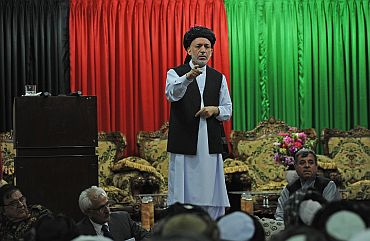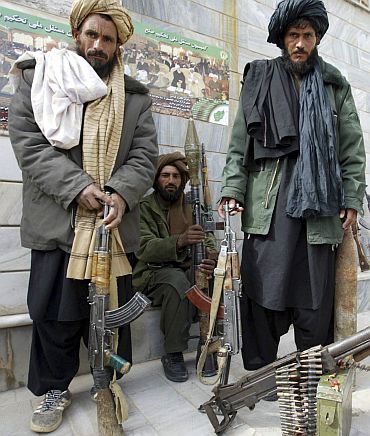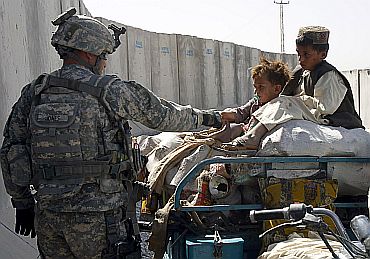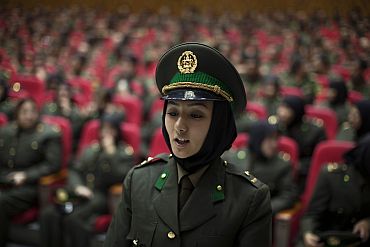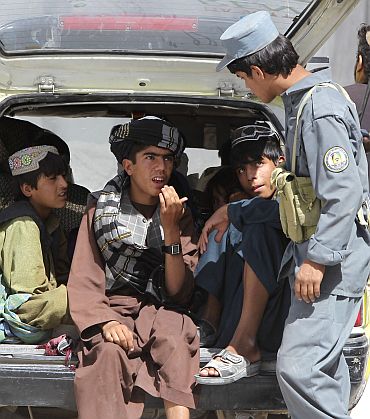 | « Back to article | Print this article |
US backs Karzai govt's 'peace talks' with Taliban
The Obama administration has said it is supportive of the peace talks between the Karzai government and the Taliban, but asserted that there is no change in its position that this requires a renunciation of Al Qaeda, following Afghan law and renouncing violence.
"But this is something that has to be Afghan-led, and we've supported for quite some time," White House Press Secretary Robert Gibbs said when asked about the secretive peace talks between the representatives of the Taliban and Al Qaeda to end the war in Afghanistan.
"This is not something that we do with the Taliban. This is something that Afghan government has to do with people in Afghanistan. And we have always been supportive of that reconciliation," Gibbs said in response to a question on the Washington Post report that the representatives of the Taliban and the Karzai government have begun high-level secret talks over a negotiated end to war.
Text: PTI
Click NEXT to read further..
'Taliban is very serious about finding a way out'
"They (the Taliban) are very, very serious about finding a way out," one source close to the talks was quoted as saying by The Washington Post, which said the peace dialogue is continuation of similar talks, hosted by Saudi Arabia that broke down about a year ago.
"While emphasising the preliminary nature of the current discussions, the sources said that for the first time they believe that Taliban representatives are fully authorised to speak for the Quetta Shura, the Afghan Taliban organisation based in Pakistan, and its leader, Mohammad Omar," the daily noted.
The Washington Post said the Quetta Shura has begun to talk about a comprehensive agreement that would include participation of some Taliban figures in the government and the withdrawal of US and NATO troops on an agreed timeline.
'But this will be an Afghan-led process'
America and NATO have 150,000 troops in the war-torn nation aiming to quell the insurgency that began soon after the Taliban regime was overthrown in a US-led invasion in late 2001.
US State Department spokesman P J Crowley said that the US has made it clear as part of its strategy that there needs to be a political component to the challenge and solution in Afghanistan.
"But this will be an Afghan-led process. We recognise that there has to be a political solution to the current challenge. That's what we've discussed in both the London conference and the Kabul conference, efforts at reconciliation and reintegration," he said.
'A reconciliation that addresses all sections of Afghan society'
"One of the things we're doing by intensively going after and putting pressure on the Taliban, both inside Afghanistan and inside Pakistan, is to create the conditions for those who, for one reason or another, are opposing the Afghan government, to switch sides. We've established clear red lines as to the conditions that need to be established or need to be adopted for any group that decides to participate in the Afghan political system. But this is an Afghan-led effort," Crowley asserted.
"We have established our criteria in terms of what we would see as acceptable for those who might seek reconciliation: renouncing violence, ending ties to Al Qaeda, and supporting the Afghan constitution and the rights that are inherent in the Afghan constitution, relative to all segments of Afghan society, including women. Anyone who adopts those criteria, in our view, can play a role in the future of Afghanistan," he said.
Vexed Aghanistan issue reaches its anti-climax
"In our discussions with President (Hamid) Karzai and the Afghan government, we have made clear that there are, in our view and this is widely shared by the international community certain red lines that we think are important," he said.
"You've heard the Secretary (of State) talk about the importance of women and their role in the future of Afghanistan. So one of our red lines is, given the history of the Taliban, for example, and their repressive policies going back to the 1990s, that we want to see an Afghanistan that advances; we don't want to see an Afghanistan that regresses," Crowley said.
"So we're not interested in recreating something that we rejected and the people of Afghanistan rejected during the 1990s. But to those elements who are willing to accept the criteria that are shared by the Afghan government and Afghan people and by the international community, we support this process," he said.
